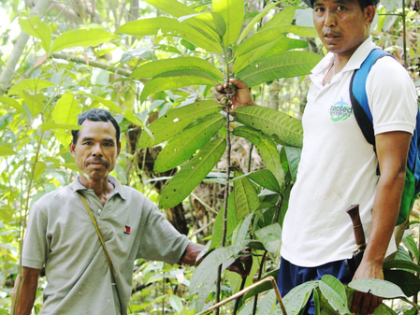Nagaland University researchers unlock medicinal secrets of rare Meghalaya plant
By IANS | Updated: November 10, 2025 18:25 IST2025-11-10T18:23:33+5:302025-11-10T18:25:08+5:30
Kohima, Nov 10 A research team from Nagaland University, the only Central university in the state, has partnered ...

Nagaland University researchers unlock medicinal secrets of rare Meghalaya plant
Kohima, Nov 10 A research team from Nagaland University, the only Central university in the state, has partnered with an Assam-based private varsity to carry out the first comprehensive scientific study on Goniothalamussimonsii, an endangered and endemic medicinal plant found in the forests of Meghalaya.
Long used by indigenous communities to treat gastrointestinal complications, throat irritation, typhoid fever, and malaria, this plant had never before been studied for its scientific or pharmacological potential.
Nagaland University officials said that the study provides scientific validation for the plant’s traditional use and reveals that G. simonsii is a rich source of bioactive phytochemicals with potent antioxidant, antimicrobial, and anticancer activities.
Using advanced analytical tools and computational modelling, the team demonstrated how natural compounds from this species interact with cancer-related proteins, offering valuable leads for the development of new, nature-based therapeutic drugs.
The Research was led by Dr Mayur Mausoom Phukan, faculty, Nagaland University, with his student Samson Rosly Sangma.
The findings were published in October 2025 in a reputable journal. The paper was co-authored by Sangma, research scholar; Dr Phukan, Assistant Professor, Department of Forestry; Dr Pranay Punj Pankaj, Associate Professor, Department of Zoology, Vahshi Chongloi, Research Scholar of the Nagaland University and Dr Dhrubajyoti Gogoi, Assistant Professor of the Assam-based private varsity.
Speaking about this research, Prof. Jagadish K Patnaik, Vice Chancellor, Nagaland University, said, “Nagaland University, in collaboration with Assam’s private University, have undertaken the first comprehensive scientific study on Goniothalamussimonsii, an endangered and endemic medicinal plant native to the forests of Meghalaya.”
“Through this study, our researchers are not only contributing to the conservation and understanding of a rare plant species but are also helping to bridge the gap between traditional knowledge and modern science,” the VC said.
Commending the research team for their dedication and innovative approach, Prof. Patnaik said that he is confident that this work will open new pathways for sustainable utilisation of our rich biodiversity.
“Nagaland University remains committed to promoting excellence in research and fostering collaborations that contribute to the scientific, cultural, and ecological advancement of the region,” he added.
Elaborating on this research, Dr Phukan said: “This study bridges traditional knowledge with modern science at a crucial time when antibiotic resistance, chronic illnesses, and the side effects of synthetic drugs continue to strain healthcare systems.”
“Our findings reaffirm that India’s rich biodiversity holds untapped potential for modern drug discovery. Goniothalamussimonsii not only offers pharmacological promise but also underscores the urgent need to conserve such endangered species,” he stated.
Highlighting the unique aspects of this research, Sangma said, “What makes this research particularly significant is that Goniothalamussimonsii is an exceptionally rare species, with its population declining alarmingly and now confined to only a few natural habitats.”
He said that this decline is largely attributed to the limited awareness of its medicinal importance among local communities.
Listed as ‘Endangered’ by the International Union for Conservation of Nature (IUCN), this remarkable plant now faces an urgent need for focused conservation efforts.
“
Beyond its immediate medicinal implications, this study represents a model for how traditional ethnomedicinal knowledge can be combined with modern biotechnological and computational methods to unlock new possibilities for drug discovery.
It also reflects India’s growing emphasis on using indigenous biodiversity as a foundation for affordable, accessible healthcare innovations.
Moving forward, the researchers plan to conduct in vivo and clinical studies to validate these findings further and explore the plant’s potential as a component of future phytopharmaceutical formulations.
Disclaimer: This post has been auto-published from an agency feed without any modifications to the text and has not been reviewed by an editor
Open in app